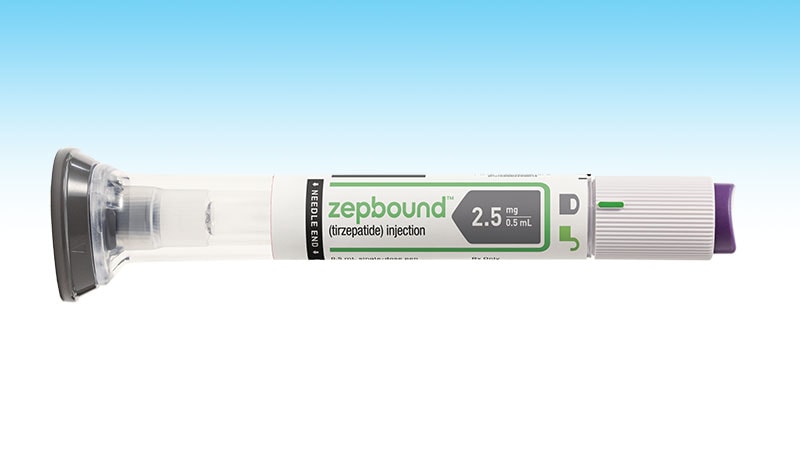Fatal Pancreatitis Cases Reported in Patients Taking Tirzepatide, a Diabetes and Weight Loss Medication
Основные понятия
Clinicians have reported cases of pancreatitis, including a fatal case, in patients taking the diabetes and weight loss medication tirzepatide. Healthcare providers should be aware of this potential side effect and closely monitor patients for signs of pancreatitis when prescribing this medication.
Аннотация
The content describes several case reports presented at medical conferences regarding pancreatitis in patients taking the antidiabetic and weight loss medication tirzepatide.
In one case, a 64-year-old patient died from severe necrotizing pancreatitis and organ failure after recently starting tirzepatide for weight loss. The researchers suggest that the risk of pancreatitis with tirzepatide should be further emphasized with a black box warning.
Another case involved a 25-year-old woman who developed necrotizing pancreatitis and cholecystitis while taking tirzepatide for weight loss. She had a good prognosis after receiving treatment.
The content notes that pancreatitis is a rare adverse effect (0.2%) of GLP-1 receptor agonists like tirzepatide, but the incidence is expected to rise with increased prescriptions of these medications. Potential risk factors include higher doses, longer treatment duration, rapid weight loss, and a history of pancreatitis, hypertriglyceridemia, cholelithiasis, or alcohol use.
Clinicians are advised to have a low threshold for stopping tirzepatide if pancreatitis is suspected, and to closely monitor patients for signs and symptoms such as persistent abdominal pain, nausea, and vomiting. While case reports can provide valuable insights, the findings need to be considered in the context of other studies and data on the association between GLP-1 drugs and pancreatitis.
Researchers Describe Cases of Pancreatitis With Tirzepatide
Статистика
Pancreatitis is a rare adverse effect (0.2%) of GLP-1 receptor agonists like tirzepatide.
The 64-year-old patient died from severe necrotizing pancreatitis and organ failure after recently starting tirzepatide for weight loss.
The 25-year-old patient developed necrotizing pancreatitis and cholecystitis while taking tirzepatide for weight loss.
Цитаты
"While tirzepatide has known significant weight loss benefits, physicians should be aware of the rare but potentially fatal side effects before initiating treatment."
"There should be a low threshold for stopping tirzepatide if pancreatitis is suspected."
Ключевые выводы из
by Jake Remaly в www.medscape.com 06-10-2024
https://www.medscape.com/viewarticle/tirzepatide-woes-pancreatitis-strikes-raising-alarm-among-2024a1000asq
Дополнительные вопросы
What are the potential mechanisms by which tirzepatide and other GLP-1 receptor agonists may increase the risk of pancreatitis?
GLP-1 receptor agonists like tirzepatide have been associated with an increased risk of pancreatitis due to several potential mechanisms. These medications can lead to an increase in pancreatic enzyme levels, which may contribute to pancreatic inflammation and damage. Additionally, GLP-1 receptor agonists have been linked to changes in pancreatic ductal cells, potentially affecting the normal functioning of the pancreas. Moreover, these drugs can slow down gastric emptying, leading to an accumulation of pancreatic secretions and potentially increasing the risk of pancreatitis.
How do the risks and benefits of tirzepatide compare to other weight loss and diabetes medications, and how should clinicians weigh these factors when prescribing treatment?
Tirzepatide, like other GLP-1 receptor agonists, offers significant benefits in terms of weight loss and glycemic control. However, the risk of pancreatitis associated with these medications should not be overlooked. Clinicians need to carefully weigh the potential benefits of tirzepatide in terms of weight loss and glucose management against the risk of pancreatitis and other adverse effects. A thorough risk-benefit analysis should be conducted for each patient before initiating treatment with tirzepatide, taking into account individual factors such as medical history, risk factors for pancreatitis, and overall treatment goals.
What additional research is needed to better understand the incidence, risk factors, and management of pancreatitis associated with tirzepatide and similar medications?
Further research is needed to enhance our understanding of the incidence, risk factors, and optimal management strategies for pancreatitis associated with tirzepatide and other GLP-1 receptor agonists. Large-scale studies are necessary to determine the true prevalence of pancreatitis in patients taking these medications and to identify specific risk factors that may predispose individuals to this complication. Additionally, research focusing on the mechanisms underlying GLP-1 receptor agonist-induced pancreatitis can provide valuable insights into preventive measures and more targeted management approaches. Clinical trials comparing the safety profiles of different GLP-1 receptor agonists, including tirzepatide, in terms of pancreatitis risk can also help guide clinicians in making informed treatment decisions.
0
